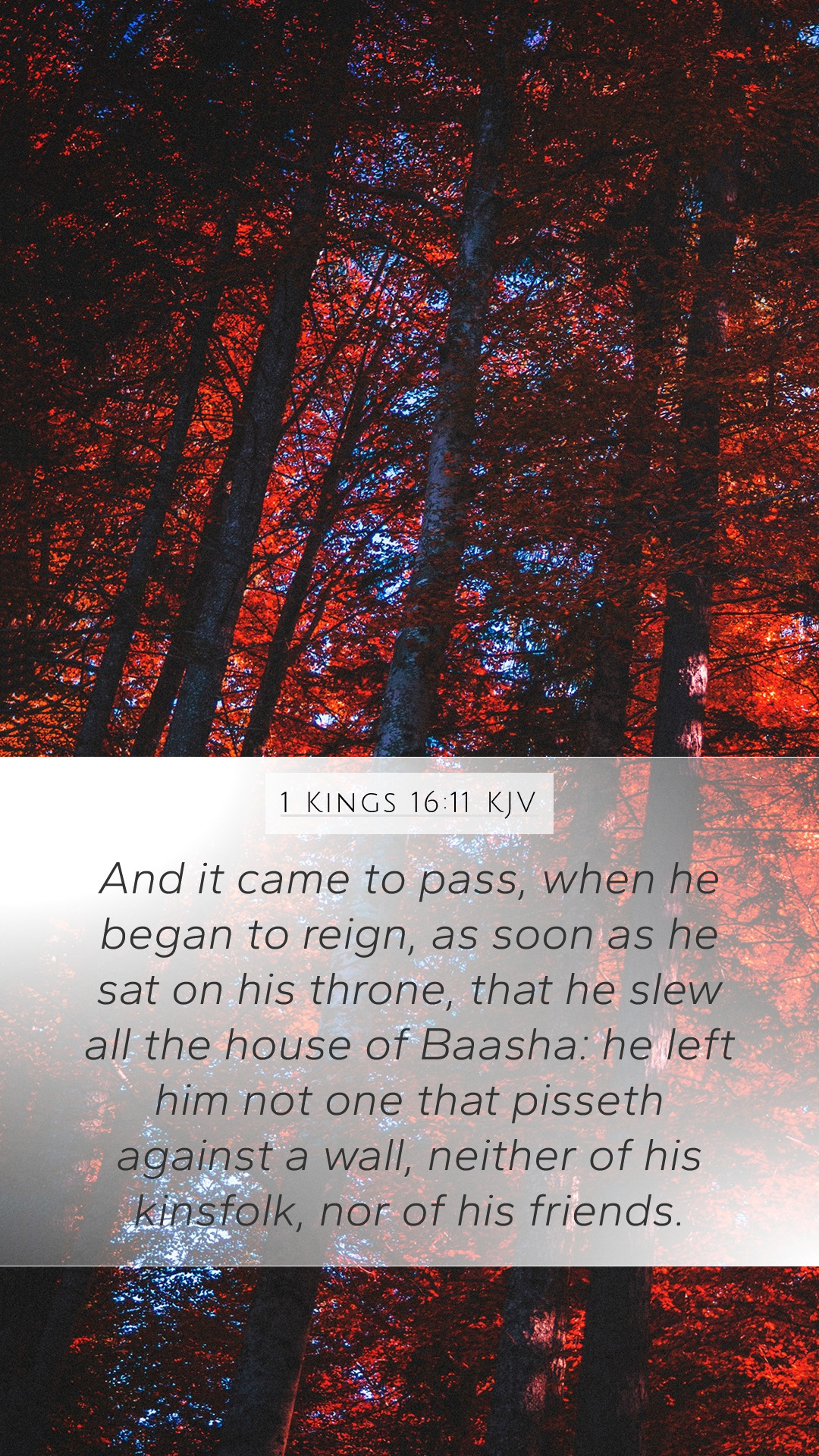Bible Verse Commentary: 1 Kings 16:11
Verse Reference: 1 Kings 16:11 - "And it came to pass, when he began to reign, as soon as he sat on his throne, that he slew all the house of Baasha: he left him not one that pisseth against a wall, neither of his kinsfolks, nor of his friends."
Understanding the Verse
The verse illustrates the complete and ruthless nature of King Zimri's rise to power. Upon ascending to the throne, he executed all members of Baasha's household, reflecting the brutal political atmosphere of the time. This passage signifies not only a change in leadership but also the extent to which a new ruler might go to secure his position.
Bible Verse Meanings and Interpretations
This context reminds readers of the often violent dynamics of power transitions described throughout the Scriptures. Below are some insights based on public domain commentaries:
-
Matthew Henry:
Henry emphasizes the severity of Zimri's actions, notably the phrase "not one that pisseth against a wall," suggesting a complete eradication of Baasha's lineage as a sign of thoroughness in political revenge. This biblical idiom represents all male descendants, indicating Zimri’s intention to stamp out any potential rivalries.
-
Albert Barnes:
Barnes notes that the phrase used by Zimri highlights the depths of vengeance found within Israel’s monarchical power struggles. He comments on the implication that these drastic actions were driven by a desire for control and consolidation of power unique to the political climate of ancient Israel.
-
Adam Clarke:
Clarke highlights the historical context of Zimri's coup, indicating that Baasha's reign was marked by continued opposition to God. Thus, Zimri’s actions could be seen as part of God’s judgment on Baasha’s household, fulfilling divine prophecy and historical judgment on the Northern Kingdom of Israel.
Scripture Analysis
When examining this verse, one must consider:
- Historical Context: The Northern Kingdom of Israel was rife with political intrigue and violence during this time.
- Theological implications: The narrative reflects God's sovereignty over the affairs of men, even in the rise and fall of kings.
- Literary devices: The vivid imagery of cleansing indicated by Zimri's actions reveals the intensity of divine retribution against the house of Baasha.
Commentary on the Nature of Power
This verse serves as a stark reminder about the nature of political power in the biblical narrative. Here are some revelations:
- Power can lead to extreme measures: Zimri's actions reflect an important ethical question regarding leadership and its impact on morality.
- Dynastic eliminations were common: The practices of killing all male descendants of a rival family illustrate the cutthroat political strategies common in ancient monarchies.
- Prophetic fulfillments are woven into historical events: This moment in scripture emphasizes how the demise of Baasha fulfilled God's word against that house, highlighting the interconnectedness of divine prophecy and human actions.
Application of Scripture
Despite the grim nature of the context, contemporary readers can derive several key lessons:
- Understanding Leadership: The extremities of Zimri's rise to power compel current leaders to reflect on the ethical implications of their deeds.
- Justice and Mercy: While God’s actions can appear harsh, they often underline deeper justice that contrasts with human fallibility.
- Divine Sovereignty: Believers are reminded that God ultimately orchestrates the events of history, and this verse prompts both reflection and reverence towards His plans.
Cross References
This verse connects to the following passages that enhance understanding:
- 1 Kings 15:29-30: Discusses the prophecy against Baasha's house.
- 2 Kings 9:7: Details God’s instructions regarding the house of Baal.
- 1 Samuel 24:21-22: Highlights the complexities of vengeance and mercy in times of conflict.
Conclusion
Overall, 1 Kings 16:11 holds profound insights into the nature of power, the fulfillment of prophecy, and the moral implications of political actions. Through examining this verse within its broader context, individuals involved in Bible study groups or seeking online Bible study resources can gain a deeper understanding of the dynamics at play within the Scriptures.


